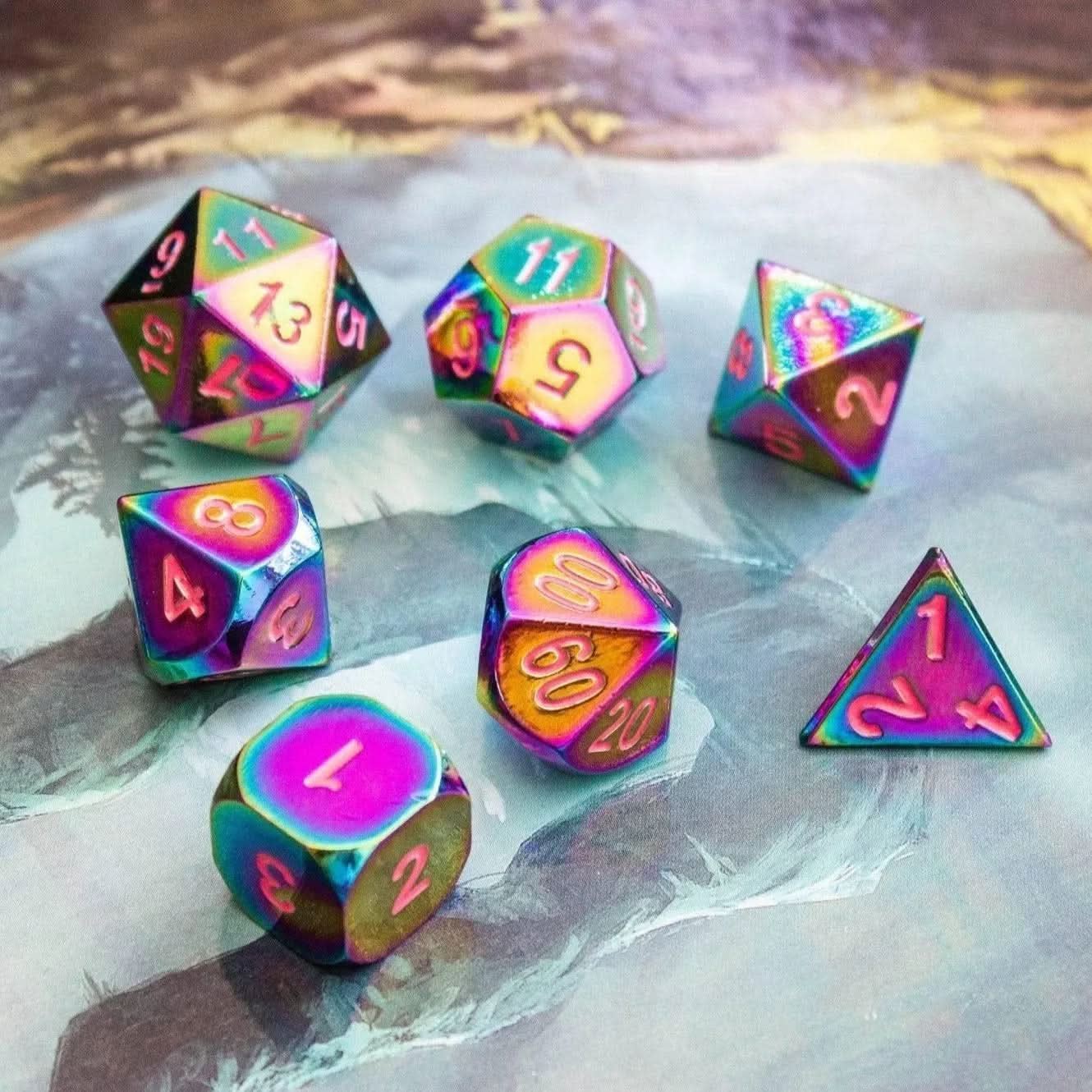In the world of tabletop gaming, every roll of the dice carries the weight of destiny. For enthusiasts, the choice of dice is almost as crucial as the game itself. While plastic resin dice have long been the staple, metal dice are making a resounding entrance, adding a touch of sophistication and heft to gaming tables worldwide.
The Rise of Metal DnD Dice: A Brief History
Metal dice aren't a recent phenomenon; they've been quietly rolling through the annals of gaming history for decades. The origins of metal dice can be traced back to the earliest days of tabletop gaming when polyhedral dice were predominantly made of materials like stone and wood. As technology advanced, so did the materials available for crafting dice. Metal dice emerged as a premium alternative, offering durability and a satisfying weight that plastic dice couldn't match.

Plastic Resin vs. Metal: The Clash of the Titans
1. Aesthetics: Plastic resin dice come in a plethora of colors and styles, often showcasing intricate designs. However, they can lack the heft and gravitas that metal dice bring to the table. Metal dice, on the other hand, are a visual spectacle. Crafted from various metals like aluminum, zinc, or even precious metals like brass and copper, they gleam with an undeniable allure. The craftsmanship that goes into metal dice often results in stunning, polished surfaces or even intricate engravings.
2. Weight and Feel: One of the most significant differences between plastic resin and metal dice lies in their weight. Metal dice are undeniably heavier, providing a satisfying tactile experience when rolled. Some gamers argue that the weight of metal dice adds a sense of gravitas to crucial in-game moments, heightening the overall gaming experience.
3. Durability: While plastic resin dice are durable and can withstand regular use, metal dice take durability to another level. They are less prone to chipping or cracking, ensuring that your investment stands the test of time. The robust nature of metal dice makes them an excellent choice for gamers who value longevity in their accessories.
4. Cost: Here's where the dichotomy becomes evident. Plastic resin dice are generally more affordable, making them accessible to a broader audience. Metal dice, with their premium materials and craftsmanship, often come with a higher price tag. The decision between the two may ultimately depend on your budget and how much value you place on the aesthetics and durability of your dice.
The Alloys of Destiny: Types of Metals Used in Dice
Metal dice come in various metals and alloys, each offering a unique aesthetic and feel. Here are some popular choices:
1. Aluminum: Lightweight and durable, aluminum dice are known for their affordability and versatility. They come in a range of colors and finishes, making them a favorite among gamers who appreciate customization.
2. Zinc: Zinc dice are heavier than aluminum, providing a more substantial feel in the hand. They often feature intricate engravings due to the ease with which zinc can be molded. The weight of zinc dice adds an extra layer of satisfaction to each roll.
3. Brass: For those seeking a touch of luxury, brass dice are an exquisite choice. Known for their rich, golden hue, brass dice exude a timeless elegance. The weight of brass dice adds a luxurious feel to the gaming experience.
4. Copper: Copper dice, with their reddish-brown patina, are a striking choice. Over time, copper dice develop a unique aging effect called a patina, enhancing their visual appeal. The weight and warmth of copper dice make them a favorite among collectors.
The Probability Play: Metal Dice in Action
Now, let's delve into the probability aspect of metal dice. While the weight and feel of metal dice enhance the gaming experience, some argue that they may impact the randomness of rolls. Statistically speaking, the difference in probability between plastic resin and metal dice is minimal.
Studies have shown that well-balanced metal dnd dice, like their plastic counterparts, exhibit fair randomness in rolls. Manufacturers take great care to ensure that the weight distribution within each die is uniform, minimizing any potential bias. However, it's essential to note that poorly balanced metal dice may yield skewed results, emphasizing the importance of choosing high-quality dice from reputable sources.
Graphs depicting the probability distribution of metal dice compared to plastic resin dice reveal subtle differences. These differences, while existing, are unlikely to significantly impact gameplay. In most cases, the joy of rolling metal dice lies more in the sensory experience than in gaining a statistical advantage.
In Conclusion: Choosing Your Metal Companion
In the end, the choice between plastic resin and metal dice boils down to personal preference. Plastic resin dice offer affordability and a vast array of designs, while metal dice provide a premium, durable, and weighty alternative that adds a touch of elegance to your gaming sessions.
Whether you're a seasoned gamer or a newcomer to the tabletop realm, the world of metal dice beckons with its glinting allure. As you embark on your gaming adventures, consider the weight of destiny in your hand and the journey each roll takes you on. After all, in the realm of tabletop gaming, every roll of the dice is a story waiting to be told.









